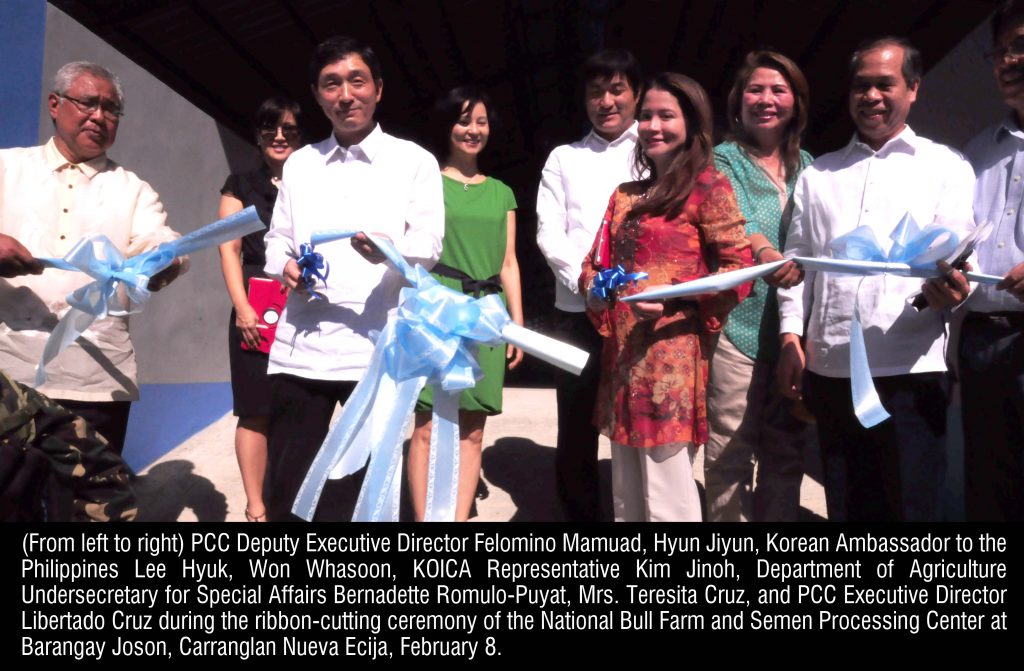The newly built state-of-the-art facilities of the Philippine Carabao Center’s (PCC) national bull farm, semen processing center, and cryobanking are resulting in a more aggressive propagation of superior animals in the country and an enlivened buffalo-based industry.
Through the 3-million US dollar grant-aid project provided by the Korea International Cooperation Agency (KOICA) to PCC, these facilities were finally put in place and are ready to cater to half a million more Filipino farmers every year.
The grant was made possible under the project, “Enhancing Livestock Sector Performance in the Philippines through an Institutionalized and Sustained Genetic Improvement Program” forged in 2010.
Specifically, the projects was aimed at improving the institutionalized data capture system, genetic data analysis and evaluation system, and unified web-based genetic information system; intensification on the organized use of reproductive biotechniques such as artificial insemination (AI), and embryo technologies in concert with DNA-based technologies towards enhanced propagation of superior animals; improvement of the current animal genetic resources cryobanking to ensure sustained s,upport for long-term GIP program; and capacitation of technical personnel in animal breeding genomics, bioinformatics, biotechnology, and other related fields.
On February 8, the national bull farm and semen processing center of PCC in barangay Joson, Carranglan, Nueva Ecija was inaugurated. In attendee during the ceremony were Korean Ambassador to the Philippines Lee Hyuk, KOICA representative Kim Jinoh, Department of Agriculture Undersecretary for Special Affairs Bernadette Romulo-Puyat, PCC Executive Director Libertado Cruz, some PCC staff members and hundreds of farmers in Nueva Ecija.
The enhanced bull farm is a major support to the semen processing and AI activities of PCC that ensure sustainability and quality production of frozen buffalo semen for the national upgrading program, said Director Edwin Atabay of the PCC at Central Luzon State University.
The cryobank repositories which consist of six huge cryotanks and liquid nitrogen depot, on the other hand, are utilized as storage for frozen animal genetic materials.
“After barely two years of construction and involvement of the local communities, I join the PCC in thanking the KOICA for these wonderful, high-tech facilities for genetic improvement and conservation of livestock animals,” USec Romulo-Puyat said.
She also said that with the state-of-the-art facilities for semen processing and cryobanking, the PCC will be able to double its semen production for wider artificial insemination services all over the country.
Ambassador Lee Hyuk, in his address, said the partnership between KOICA and PCC aims to strengthen and sustain the PCCs existing genetic improvement program for the livestock animals in the Philippines.
Dr. Cruz, on the other hand, said that with the newly constructed facilities coupled with trained PCC staff members, the PCC will already be able to address not only buffalo-related concerns but the whole of the livestock industry.
“These facilities allow us to cover three to four folds more than the usual number of farmers we service a year. Now we are confident that we can cater to half a million more farmers in the country every year,” he added.
Dr. Cruz said further that more than the facilities and human capacitation is the solid friendship and partnership between the Korean people and the Filipino people toward a common goal of uplifting the lives of Filipino farmers and enhancement of the competitiveness of the domestic livestock sector.

